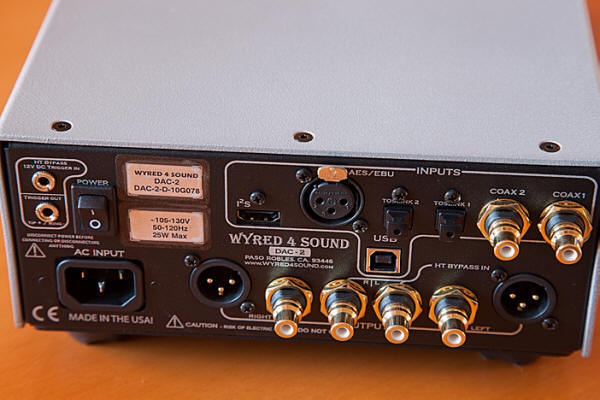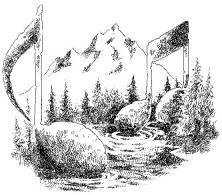|
You are reading the older HTML site
Positive Feedback ISSUE 51
The Wyred 4 Sound DAC-2:
Let's All Get Totally Wired
In the "6moons.com" review of the Wyred 4 Sound DAC-2 page, it says: "Discrete as Casanova? Perhaps not. Definitely though an output stage that won't bed any op-amps. In the $1499 DAC2, there's 24/192 async USB via proprietary drivers for 32/64-bit Windows XP/Vista/7 and Mac OS 10.4 through 6." And I am dancing in the street because that's why this thing sounds so frigging good, NO op amps. OK, that's not the ONLY reason it sounds so good, and it's not going to win the if product design award that LaCie's 2big and Little Disk Families have, both of which I have owned; however, setup properly and burned in for a VERY long time, the W4S DAC-2 can sound really lovely as has been revealed to me (I'm beginning to sound prophetic) in both my office system—both on the speakers and with my Blossom balanced headphone amp driving my "universal" Silver Dragon Ultrasone Edition 8's via the balanced connector extension—AND in my main system where it held up very well against the USB-directly-driven dCS Debussy and the Sonicweld Diverter/Locus Core S/PDIF cable driven Audio Note [all tube analog] DAC 3.1X. All things considered it sounded closer to the latter—which is less of a surprise to me now that I know it doesn't have any op-amps in the output stage; op-amps are evil, my Dad and I built I "lie detector" using one from Radio Shack in the 1970's; do you really want that in your DAC?—but, like I said it took a very long time to burn in, continuous iTunes repeats for several (well, 2) weeks. Before that, it seemed a little rough around the edges and it warbled some on high resolution material and quite honestly I told Dave Clark, the editor of PFO, that I didn't think I could review it because I couldn't think of anything nice to say. He told me to just burn it in for a very long time, which I did, and NOW I'm planning to purchase the demo unit. To establish the main context, here's my office system:
The software I used to drive the W4S was iTunes 10—have you noticed the drawer icon is no longer a spinning CD? It's a music note in a blue circle—running under Mac OS 10.6.4 and Amarra 2.0, which is great and really ties the whole thing together anywhere from 16/44.1 to 24/192 (yep, the W4S DAC-2 goes that high; I have heard it and it is a thing of beauty). You do have to install drivers to get the DAC-2 to work; but they can be uninstalled should it ever be necessary. My wise cracks about op-amps notwithstanding, because I honestly don't know what makes the dCS run (I had always assumed it was magic) it is the case that both the dCS and the Audio Note DAC 3.1X have a little more air or ambience than the W4S DAC-2, which can be quite forward in the midrange; but that's OK. It continues to open up, even now, and Amarra helps; so for $1499, I say go forth and multiply (i. e., multiply the number of Prius's you can have and still get music from your computer with quality). With regard to my comments on its appearance (I have the "silver" one, which is still mostly black; I actually prefer the aesthetics of the all black, but I'm not being picky about the demo purchase) the W4S DAC-2 is—as my former girlfriend Robin would say—just another black and silver shiny thing; although, she would often say it with great frustration practically sputtering like Daffy Duck because she was so mad at me for buying a Spectral DMA-150 without telling her first. But really, the DAC-2 is a thing of beauty because it MAKES beauty out of bytes; so, like Picasso, it/he is more the artist than the art. Here's a brief description of what you see on the front panel and how it operates; (by the way, I've just used a very old but serviceable Nordost El Dorado power cable for all my testing because of its richness of sound; I did not try the Shunyata Diamondback Platinum I have because it cleans up the bass too much and the bass coming from the DAC-2 is fine as is): You see a two-line LED display—sort of like the electronic banners at Times Square only on a much smaller scale—with silver buttons on either side marked "Down" on the left and "Up" on the right and one below the display marked "Power". To get the power switch to turn the DAC-2 on or off, you have to hold it in for several seconds. The same thing is true of the dCS Debussy and is a sensible safety precaution; however, it allows the "Power" switch on the DAC-2 to have a separate function, which is to toggle the "cursor"— for lack of a better term—between the higher and lower, or first and second, line on the "Times Square display". Once you're on the upper line, you can use the "Up" and "Down" buttons to select the input (USB, S/PDIF or "COAX", AES/EBU, Etc., and sometimes more than one of each) and on the lower line, the volume, which at least with the USB input only goes to 65; but that does seem more than enough output to drive any reasonably powerful line-level input. In fact, I leave it at 60 going into one of the line level ins on my Tri TRV-88SE KT88 tube 45w push-pull class AB integrated amp to avoid overloading the amp and distorting. I have tried using this DAC, in my main system, both with direct USB connection to my 13" MacBook Pro using a Locus Design Cynosure USB cable—which costs about twice as much as the DAC-2—and I have also used it "indirectly" by plugging the Cynosure into my Sonicweld Diverter and then running the S/PDIF out of that (the Diverter being an immensely well-designed USB --> S/PDIF converter) into the "COAX 1" in of the DAC-2 via a Locus Design Core S/PDIF cable. I would have to say, all things considered, I prefer the latter arrangement; the music has more "height" and "structure". On the other hand, I actually asked Lee Weiland at Locus Design to build me 6 foot Axis USB cable (his second to least expensive, costing about $729 for that length) because I plan to purchase the demo unit after they swap out the silver for a black case and use it to replace my Apogee Duet, as it is more reliable and much better sounding; in both cases, I have been using Locus Design Vision interconnects with the Apogee Duet and the W4S DAC-2, and in the latter case, it just keeps getting better as you add better cabling even though it only costs $1499. So think of the USB cable, DAC and analog interconnects as a matched "kit" and don't worry about the Sonicweld Diverter until you move the DAC-2 into your main system, with your Spectral monoblocks and Wilson WATT/Puppies or, in my case, the 7-watt per channel Audio Note Meishu Phono Silver and some highly efficient Audio Note AN-E SEC Silver loudspeakers which go down to 20Hz and play very loud, even using just two Western Electric 300B's (two total, 1 / channel). I guess the greatest compliment a reviewer can give the manufacturer is to ask to buy the demo unit (with some aesthetic changes) and to even spend quite a bit of money on having a custom, higher-end, 6 foot cable built for it, and to get a second copy of Amarra 2.0 with the iLok dongle and everything to "process" the sound a little and control the MIDI settings, so the DAC knows it's getting a 24/192 signal (which I did sample and which sounded lovely).
As I said before, my main complaint is that the sound is a little forward and lacks some air and ambience; however, that depends greatly on what cables you use—both digital and analog—and the kind of music you enjoy (i. e., the quality of the recording, how much air and ambience is there to begin with, etc.). I have expressed my preference for the black one and expressed SOME concern at having to use drivers to get it to function at higher resolutions on a Mac. I know that's necessary for the PC but most, or at least many, higher resolution devices I know of don't use drivers with USB 2.0 on a Mac, and when I say USB 2.0, I mean "24/176.4" or "24/192", although there's nothing WRONG with using a driver as long as you can remove them, which you can. So I suppose, to sum things up, despite a few minor complaints that really apply more to a $10K DAC, the Wyred 4 Sound DAC-2 can give you some very lovely sound with a minimum amount of effort and a true plethora on input choices and configuration options, like volume control and processing up to 24/192KHz files (automatically selected with Amarra 2.0, I add again). I think—although it does have a bit more air and ambience and perhaps an overall more elegant design and user interface—given that the PS Audio PerfectWave DAC costs almost exactly twice as much as the DAC-2 (it appears to retail for $ 2999.99 commonly) and you can get the DAC-2 and put that extra $1500 into some bitching cables—I say go with the DAC-2. There's nothing wrong with the PerfectWave, and it has a slightly higher "Wife Acceptance Factor"; however, I could never find a filter on it that sounded quite right and – quite honestly—I don't know what kind of filtering the W4S DAC-2 uses but, as Goldilocks said, "It's just right". Like I said, I'm buying the demo. Kindest regards, Andy
Wyred 4 Sound
|



